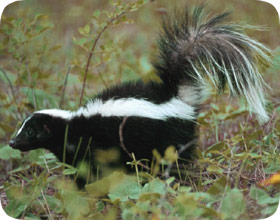
| Home | Arlington | Alexandria | Squirrel | Raccoon | Bird | Bat | Opossum | Skunk | Rat/Mice | Snake |
Fairfax County Skunk Control & Removal
|
About Skunks: Everyone knows the black and white skunk and its smelly spray. Skunks commonly live under
GA sheds and decks. They cause a big problem with their odor. They also
commonly dig holes throughout a yard in their search for grubs.
Skunk are a common nuisance animal in northeast Virginia. In Fairfax County and Arlington County, skunk have become a particularly common problem, as they have invaded many homes in the area. If you need a professional solution for your Fairfax County skunk problem, give us at A Wildlife Pro a call. We are experts at skunk control and removal, and have been working with Virginia wildlife for over 10 years. We are familiar with the habits of Virginia skunks, and are experts at humane trapping and removal of this critter. Give us a phone call any time, and we can schedule a same-day or next day appointment. |
 |
Fairfax County Animal Control Home Page - Learn about all of our services, and more about our animal control company.
|
We cover a wide service range and remove wildlife in all of Fairfax County, VA and the Washington DC metropolitan area, including all of Arlington County and the city of Alexandria, and the towns of
Annandale, Bailey's Crossroads, Belle Haven, Burke, Centreville, Chantilly, Dunn Loring, Fort Belvoir, Fort Hunt, Franconia, Great Falls, Groveton, Huntington, Hybla Valley, Idylwood, Jefferson, Lake Barcroft, Lincolnia, Lorton, Mantua,
McLean, Merrifield, Mount Vernon, Newington, North Springfield, Oakton, Pimmit Hills, Reston, Rose Hill, Seven Corners, Springfield, Tysons Corner, West Springfield, Wolf Trap, and more. We also service areas outside of Fairfax, such as Sterling
in Loudon County, and Manassas in Prince William County. If in doubt about our service range or any of the types of services we offer, just give us a call, and we will let you know if we service your area and/or your wildlife problem. We look forward to hearing from you! |

Fairfax County Skunk Control Emails:
Response to "Commends City for pursuing catching"
Re: "Commends City for pursuing humane critter trap catching," by Jeff The Wildlife Control Operator, the only people thanking the Alexandria, VA Council for considering the implementation of a humane skunk management plan are the Animal trappers.
Wildlife biologists know that killing a significant number of skunk kick-starts skunk reproduction into overdrive. Wildlife management is designed to produce more "game" animals for the Animal trapper" and more license fees to pay game agency salaries. Studies show that in non-caught areas there are far less skunk than in caught areas. skunk, unlike humans, bring their numbers in balance with available resources, when left alone.
The proper target for complaints about skunk is our state wildlife agency, The Fairfax County Virginia Division of Natural Resources (ODNR). In addition to intentionally increasing skunk numbers through catching and habitat manipulation, the Animal trappers that ODNR serve are responsible for skunk-car accidents. Animal trappers (including poachers) scare skunk onto roads. The Erie Insurance Company's data demonstrated that there was a five-fold increase in skunk-car accidents the opening day and opening Saturday of catching season.
The Independence Chief of Police noted: "An accident we had was a guy east of route 21 in the woods. He shot a skunk that ran out onto route 21 and into the side of a car."
Alexandria, VA Police Chief, himself a humane critter trap animal trapper, refused to allow humane critter trap catching in the city. He said, "As a Animal trapper I don't think anyone wants to see skunk expire in their front yards. I'm responsible for the people of the city of Alexandria, VA and their properties. That's why I can't condone catching. skunk can run for miles before collapsing and dying of arrow wounds. They can even get hit through the lungs and still run."
The Wildlife Control Operator predictably blames the disrupted predator-prey relationship for the increase in skunk, when it was Animal trappers who exterminated natural predators. Aside from the fact that it is the number of prey animals that determine the number of predators that an ecosystem can support (not the opposite), predators strengthen the gene pools of prey species, while it has been demonstrated that Animal trappers weaken gene pools. Natural predators prey on weak, sick, old animals; phony predators (Animal trappers) prey on the largest and strongest.